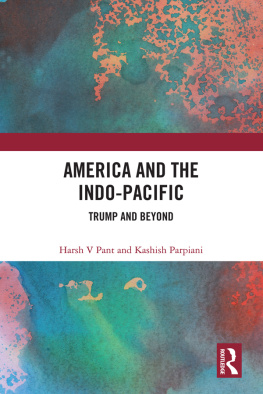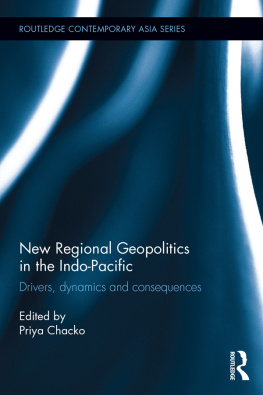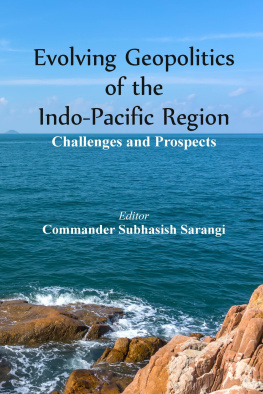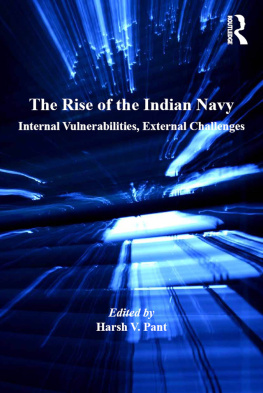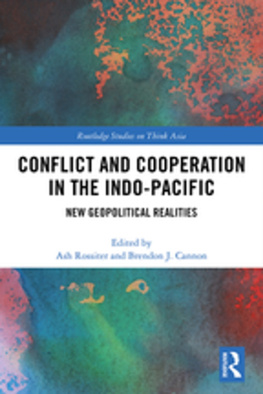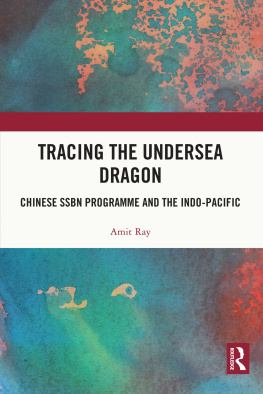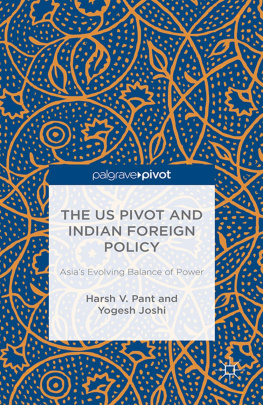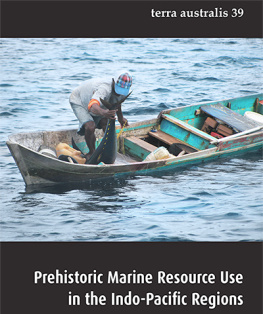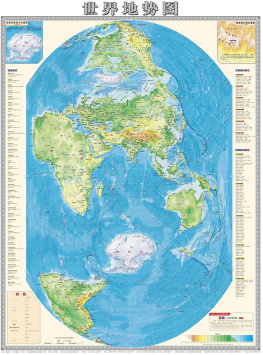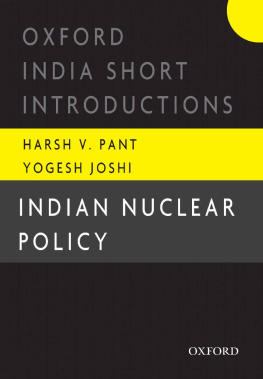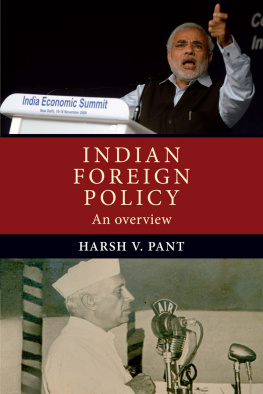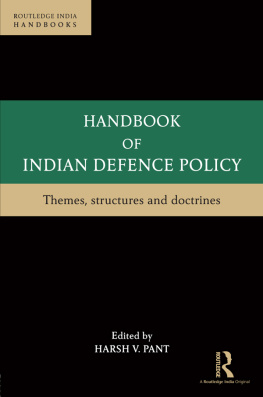AMERICA AND THE INDO-PACIFIC
This book offers an extensive account of Donald Trumps foreign policy record in the Indo-Pacific region. Set against the backdrop of Trumps policy of sustained US confrontation with China, it recounts his administrations efforts to shore up Americas position with the Indo-Pacific strategy. It also reviews Trumps record with allies and partners in the Indo-Pacific and the South Asian subregion in context of the great power competition between China and the United States. Amidst the ongoing conversations on the declining currency of American internationalism, the volume showcases the seeming insularity of the Indo-Pacific region from forces that are informing an America in retreat. In noting Trumps record to have been a consequential one, the authors also offer insights into the prospects for US policy continuity under Joe Biden.
This timely book will be of great interest to scholars, teachers, and students of politics and international relations, Asia studies, USChina studies, area studies, foreign policy, maritime studies, and world politics. It is a recommended read for all watchers of US foreign policy and the evolving USChina rivalry.
Harsh V Pant is Professor of International Relations at Kings College London. He is Director, Studies and Head of the Strategic Studies Programme at Observer Research Foundation, New Delhi, India. He is also Director (Honorary) of Delhi School of Transnational Affairs at Delhi University. His current research is focused on Asian security issues. His most recent books include New Directions in Indias Foreign Policy: Theory and Praxis (2018), Indian Nuclear Policy (2018), The US Pivot and Indian Foreign Policy: Asias Evolving Balance of Power (2015), Handbook of Indian Defence Policy (2015), and Indias Afghan Muddle (2013).
Kashish Parpiani is Fellow at Observer Research Foundation, Mumbai, India. His research interests include USIndia bilateral ties and US foreign policy in the Indo-Pacific. He has published with the Institute for National Security Studies (Israel), the Centre for Asia and Globalization (Singapore), Deccan Herald (India), the Marine Corps University Press (US), The Hindu (India), and the Rising Powers in Global Governance Project (Turkey). He has presented papers at conferences organised by the Shanghai University, the International Studies Association (ISA), and London School of EconomicsIDEAS. On varied matters pertaining to USIndia ties and US foreign policy, he has been quoted in media platforms such as The Wall Street Journal, South China Morning Post, Foreign Policy, Bloomberg, TIME magazine, and Al Jazeera.
First published 2022
by Routledge
2 Park Square, Milton Park, Abingdon, Oxon OX14 4RN
and by Routledge
605 Third Avenue, New York, NY 10158
Routledge is an imprint of the Taylor & Francis Group, an informa business
2022 Harsh V Pant and Kashish Parpiani
The right of Harsh V Pant and Kashish Parpiani to be identified as authors of this work has been asserted by them in accordance with sections 77 and 78 of the Copyright, Designs and Patents Act 1988.
All rights reserved. No part of this book may be reprinted or reproduced or utilised in any form or by any electronic, mechanical, or other means, now known or hereafter invented, including photocopying and recording, or in any information storage or retrieval system, without permission in writing from the publishers.
Trademark notice : Product or corporate names may be trademarks or registered trademarks, and are used only for identification and explanation without intent to infringe.
British Library Cataloguing-in-Publication Data
A catalogue record for this book is available from the British Library
Library of Congress Cataloging-in-Publication Data
A catalog record for this book has been requested
ISBN: 978-1-138-57070-2 (hbk)
ISBN: 978-1-032-05105-5 (pbk)
ISBN: 978-1-003-19603-7 (ebk)
Typeset in Sabon
by Apex CoVantage, LLC
CONTENTS
Obamas Asia and Trumps campaign
2 The Trump presidency and China
3 Trump and the Indo-Pacific
4 Trump and South Asia
Conclusion
- 1 Obamas Asia and Trumps campaign
- 2 The Trump presidency and China
- 3 Trump and the Indo-Pacific
- 4 Trump and South Asia
- Conclusion
Guide
The idea of this book germinated in the early years of the Trump presidency when the widespread structural, institutional and normative disruption was the order of the day. At that time, we decided to embark on a book project that was aimed at exploring Trumps approach to Asia. But for various reasons, the project got delayed and by the time we started to work again, the four years of President Trump were coming to an end. Americas approach to the Indo-Pacific had taken a much more concrete shape and the challenge of the COVID-19 pandemic had ensured that most of the old assumptions about the international system had to be re-examined.
This book presents a detailed account of Donald Trumps foreign policy record in the Indo-Pacific region and explicates his administrations efforts to shore up Americas position with the Indo-Pacific strategy. It examines Trumps engagements with Americas allies and partners in the Indo-Pacific, amidst the wider shift in the regional balance of power and a sharpening contestation between the US and China. In more ways than one, this book underscores the seeming insularity of the Indo-Pacific region from forces that are informing an America in retreat.
We would like to thank Shashank Shekhar Sinha of Routledge India who first pushed us into taking up this project. Though we failed to meet his initial time-line, we do hope that this volume has justified his efforts to invest in this endeavour. We are grateful to Shashank and his entire team for bearing with us and having the faith in our ability to deliver when at times we ourselves faltered. We would also like to thank the Observer Research Foundation for giving us the much needed time and space to complete this project. And finally, thanks to our families for all their support!
Donald Trumps election victory in 2016 put the future of American internationalism in a state of limbo. On the campaign trail, Trump purported a conservative nationalist vision for US foreign policy which sought to upend postCold War American advocacy of globalisation, furtherance of liberal Wilsonian values, and sustenance of Americas constellation of allied and partner nations (some of which even date back to the end of the Second World War). Apprehensions over Trumps America First proposition which fast devolved from merely being subject to allegations of isolationism to having spurred the untoward reality of unilateralism at its worst in terms of America alone, were compounded by the emergence of new age threats to the international system.
Away from yesteryears state-led or state-centred threats, by 2016, the world had witnessed newer challenges, such as the diffusion of terror networks with lone-wolf attacks, rise of multipolarity further problematising global governance, democratisation of information ushering a post-truth era, technological advances risking the future of traditional manufacturing jobs, and global interconnectedness provoking socio-economic anxieties around the world.
Furthermore, the future of the liberal world order stood at a crossroad with the evolving USChina rivalry. The Chinese threat to American Philippines.

